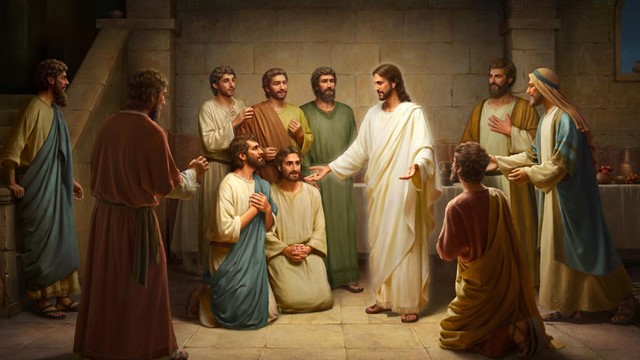Know Three Types of People From the Miracle That Jesus Heals a Man Born Blind
Early this morning, my friend came to my home and read the Bible with me. We read John 9:1-39:
“And as Jesus passed by, he saw a man which was blind from his birth. And his disciples asked him, saying, Master, who did sin, this man, or his parents, that he was born blind? Jesus answered, Neither has this man sinned, nor his parents: but that the works of God should be made manifest in him” (John 9:1–3).
“When he had thus spoken, he spat on the ground, and made clay of the spittle, and he anointed the eyes of the blind man with the clay. And said to him, Go, wash in the pool of Siloam, (which is by interpretation, Sent.) He went his way therefore, and washed, and came seeing” (John 9:6–7).
“Therefore said some of the Pharisees, This man is not of God, because he keeps not the Sabbath day. Others said, How can a man that is a sinner do such miracles? And there was a division among them. They say to the blind man again, What say you of him, that he has opened your eyes? He said, He is a prophet. But the Jews did not believe concerning him, that he had been blind, and received his sight, until they called the parents of him that had received his sight. And they asked them, saying, Is this your son, who you say was born blind? How then does he now see? His parents answered them and said, We know that this is our son, and that he was born blind: But by what means he now sees, we know not; or who has opened his eyes, we know not: he is of age; ask him: he shall speak for himself. These words spoke his parents, because they feared the Jews: for the Jews had agreed already, that if any man did confess that he was Christ, he should be put out of the synagogue. Therefore said his parents, he is of age; ask him” (John 9:16–23).
“The man answered and said to them, Why herein is a marvelous thing, that you know not from where he is, and yet he has opened my eyes. Now we know that God hears not sinners: but if any man be a worshipper of God, and does his will, him he hears. Since the world began was it not heard that any man opened the eyes of one that was born blind. If this man were not of God, he could do nothing. They answered and said to him, You were altogether born in sins, and do you teach us? And they cast him out. Jesus heard that they had cast him out; and when he had found him, he said to him, Do you believe on the Son of God? He answered and said, Who is he, Lord, that I might believe on him? And Jesus said to him, You have both seen him, and it is he that talks with you. And he said, Lord, I believe. And he worshipped him. And Jesus said, For judgment I am come into this world, that they which see not might see; and that they which see might be made blind” (John 9:30–39).
After reading this passage in the Bible, we both felt there was profound meaning in it and pondered it for a while. Then we started to express our own opinions about this story.
First, I said: “From this story, I can see three different types of believers’ attitudes toward God. The Pharisees represent the type of people who believed in God but resisted Him; the blind man represents the type of people who saw the wondrous deeds of the Lord Jesus and then admitted that He is from God; the parents of the blind man represent the type of people who were timid and cowardly, who feared people of influence and esteemed those with status, and who thus dared not admit that the Lord Jesus is Christ. However, what I can’t understand is this: Jesus did such a great deed, curing a man who was born blind, so why didn’t the Pharisees realize the Lord Jesus is Christ? Why did the Pharisees believe in God but resist Him?”
While I was thinking this over, my friend suddenly said: “In fact, it is not difficult to answer these questions. Some time ago, I saw a passage on a gospel website which can clearly answer your questions. Let’s look at these words.” In order to know the reason, I agreed with her readily. Thereupon, she opened the gospel website, found that passage and read: “Do you wish to know the root of why the Pharisees opposed Jesus? Do you wish to know the essence of the Pharisees? They were full of fantasies about the Messiah. What is more, they believed only that the Messiah would come, yet did not seek the life truth. And so, even today they still await the Messiah, for they have no knowledge of the way of life, and do not know what the way of truth is. How, say you, could such foolish, stubborn and ignorant people gain God’s blessing? How could they behold the Messiah? They opposed Jesus because they did not know the direction of the Holy Spirit’s work, because they did not know the way of truth spoken by Jesus, and, furthermore, because they did not understand the Messiah. And since they had never seen the Messiah and had never been in the company of the Messiah, they made the mistake of clinging in vain to the name of the Messiah while opposing the essence of the Messiah by any means possible. These Pharisees in essence were stubborn, arrogant, and did not obey the truth. The principle of their belief in God was: No matter how profound Your preaching, no matter how high Your authority, You are not Christ unless You are called the Messiah. Are these views not preposterous and ridiculous?” (“By the Time You Behold the Spiritual Body of Jesus, God Will Have Made Heaven and Earth Anew”).
After reading, she said: “From this passage I understand that the reason why the Pharisees believed in God but resisted Him is because they were arrogant by nature and they stubbornly held to their views. They did not seek the truth, much less accept the truth. From these two sentences the Pharisees said, ‘This man is not of God, because He keeps not the Sabbath day’ and ‘How can a man that is a sinner do such miracles,’ we can see that they randomly judged the work of the Lord Jesus and accused Him without the tiniest bit of fear in their hearts. Though they believed that the Messiah would descend, they didn’t recognize the Messiah at all. Therefore, when the Lord Jesus came to do His work, they didn’t accept that He came from God but condemned the Lord Jesus because He didn’t abide by the law of the Old Testament but worked and performed miracles on the Sabbath day. They had found authority and power in the Lord Jesus’ words and work, yet they refused to accept Him, and even attacked, slandered and blasphemed Him just because God’s name was not Messiah. In the end, they nailed the Lord to the cross, thus committing a heinous crime and severely offending the disposition of God.”
After hearing her explanation, I nodded my approval. At this moment, I also thought of the fact that not only did the Pharisees themselves resist God, but they also deceived believers and incited them to oppose and condemn the Lord Jesus. Whoever accepted that Jesus was the Savior, the Pharisees would throw him out of the synagogues. So, the believers dared not follow or rely on the Lord Jesus, and they lost the Lord’s salvation. That’s why the Lord Jesus cursed the Pharisees: “But woe to you, scribes and Pharisees, hypocrites! for you shut up the kingdom of heaven against men: for you neither go in yourselves, neither suffer you them that are entering to go in” (Matthew 23:13). I could see from this that in essence the Pharisees hated the truth. Not only didn’t they accept the truth, but they also obstructed others from accepting the truth.
Soon after, she continued by saying: “And you mentioned just now that the blind man’s parents also represent one type of people. Though they were deceived by the Pharisees, they were revealed to not love the truth. Just as the passage says: ‘Some people do not rejoice in the truth, much less judgment. Instead, they rejoice in power and riches; such people are called power seekers. … For they value only status, prestige, and power, and they esteem only large groups and denominations. They have not the slightest regard for those led by Christ; they are simply traitors who have turned their backs on Christ, on truth, and on life’ (‘Are You a True Believer in God?’).
“From the passage and the verses in the Bible we read just now, we can see that the blind man’s parents esteemed influence and were in fear of the Pharisees, priests and scribes in high positions. They believed in the Pharisees and their influence instead of God. They clearly knew that the Lord Jesus had worked such a great wonder and, by rights, they should have been grateful that He cured their son’s blindness and should have borne witness for Jesus’ deeds before the crowd. However, seeing that the Lord Jesus, like most people, didn’t have a high position in society, they dared not acknowledge the power of the Lord Jesus in order to not be expelled from the synagogue. In their hearts, instead of respecting God as great they put status and influence as being above all else. They saw that the Pharisees knew the Bible very well, often explained scriptural knowledge and theological theories, had status and good reputations and were endorsed, looked up to, and even idolized by the common people, so they were willing to accept the status and influence of the Pharisees and follow them. They believed that they could be saved only if they weren’t thrown out of the synagogue. They entrusted their own hopes of salvation to the Pharisees, so how could they know that these people had been resisting the Lord? That’s how their own futures were ruined by the Pharisees.”
At this point, I felt what she said was very enlightening. After that, she talked about the kind of people like the blind man and read another passage to me: “Knowledge of God’s authority, God’s power, God’s own identity, and God’s essence cannot be achieved by relying on your imagination. Since you cannot rely on imagination to know the authority of God, then in what way can you achieve a true knowledge of God’s authority? … Not using your brain to think and imagine means not using logic to infer, not using knowledge to analyze, not using science as the basis, but instead appreciating, verifying, and confirming that the God you believe in has authority, confirming that He holds sovereignty over your fate, and that His power at all times proves Him to be the true God Himself, through the words of God, through the truth, through everything that you encounter in life. This is the only way that anyone can achieve an understanding of God” (“God Himself, the Unique I”).
“The passage reveals that the way of understanding God is to experience God’s deeds through the words God has expressed and through practical experiences, just as the blind man recognized Jesus. Our common sense tells us that eye problems would get more serious if we anointed our eyes with clay and spittle. Nevertheless, the blind man could see again after washing in the pool of Siloam according to the Lord Jesus’ instructions. He understood that the Lord Jesus had the authority and power that an ordinary created man wouldn’t possess. So he said: ‘Now we know that God hears not sinners: but if any man be a worshipper of God, and does his will, him he hears. Since the world began was it not heard that any man opened the eyes of one that was born blind. If this man were not of God, he could do nothing’ (John 9:31–33). We can see from the blind man’s words that he had known the Lord Jesus was from God. That he could appreciate God’s authority and power didn’t depend on how much scriptural knowledge or the meaning of doctrines that he understood, or on how much he ran around and how much work he did. Instead, it was through Jesus’ words and work that he appreciated it. We can see from this that the blind man’s spiritual eyes were not blind.”
Hearing what she shared with me threw me into a whirlwind of thought: Those people had been looking forward to the Messiah’s descent in the Age of Grace, but when the Lord truly came they adopted differing attitudes, which determined whether they would succeed or fail in believing in God. Nowadays, we, as believers in the Lord Jesus, are all looking forward to the Lord’s return. But regarding the matter of the Lord’s return, will we become one of these three types of people?
I could not help sighing with feeling: “I mustn’t be a Pharisee and resist and condemn God’s work, nor should I be like the blind man’s parents, who didn’t have a sense of justice and were timid and cowardly. They had seen God’s work, authority and power but couldn’t break free from the control and bonds of status and influence. They preferred to be in collusion with those religious leaders and die in the synagogue rather than bear witness to God’s deeds and follow the footsteps of God, so they lost God’s salvation. I will learn from the blind man and recognize God from His words and work, and experience and confirm His authority and verify His identity and status from His deeds. Only in this way can we follow the footsteps of God and welcome the Lord’s return.”
After she heard this, she nodded in agreement. I really thank the Lord that today I received all this through reading the Bible with her. May all glory be to the Lord!





